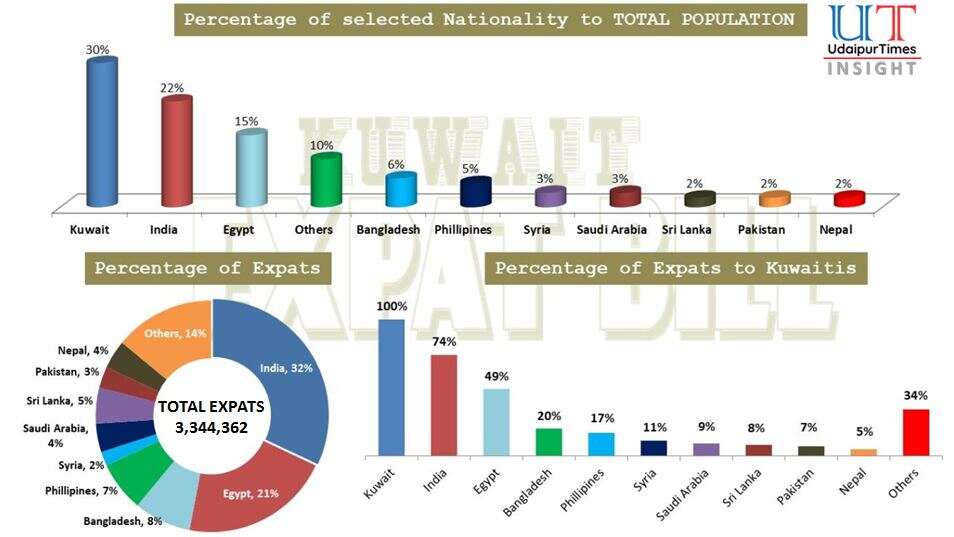Kuwait expat bill will take care of rights and compensation of expats, says Minister | Gradual process over years
The National Assembly of the government of Kuwait approved a draft expat quota bill, which apparently has become a cause of concerns for a mammoth population of expats in the gulf country. The legal and legislative committee of the National Assembly has determined that the bill is constitutional.
The anit-expat rhetoric created by the COVID crisis and the subsequent bottoming of crude oil prices have got the Middle East countries thinking on the next steps and this bill is an outcome of the anti-expat rhetoric.
National Asembly speaker Marzouq-al-Ghanim said that another bill will be submitted to propose a remedy to the demographic imbalance.
Ghanim argued that it is not appropriate to define a percentage for each category or nationality. The demographics need to be taken into cognizance along with the skill set and field of specialization as well as qualifications.
He further said that Article 4 of the Bill mandates that the decisions on the implementation can be taken 6 months after the enforcement of the bill. This will permit a gradual reduction in the work force. He further said that Article 4 of the Bill mandates that the decisions on the implementation can be taken 6 months after the enforcement of the bill. This will permit a gradual reduction in the work force. For example, in the first year the percentage will be retained to 70%, which will be reduced to 65% in the next year, and so on.
Visa trading has been one of the main causes of the imbalance. Of the total population of 4.8 million, 3.35 million are expatriates, and of these 1.3 million are illiterate. This number is a cause of concern and Visa trading needs to be banned altogether.
Ghanim said that the unnecessary expatriates will be asked to leave the country and there will be a fair compensation for the damages they suffer. These will be paid through the expatriates fund, which will be financed through various resources like public institutions, fines and fees collected from expatriates.
Editors Note
Breakup of the numbers
Of the nearly 1 and a quarter million Indians working in Kuwait, nearly half a million work in the private sector. Around 28,000 Indians work for the Kuwaiti government in various capacities, viz. scientists, engineers, nurses, helpers and technicians. There are approximately 116,000 dependents and nearly 60,000 students study in the 23 Indian schools in Kuwait.
"Not only will a knee jerk implementation of the bill be affecting the expat population negatively, it will also be detrimental to the interests of the Kuwaiti government, the public as well as private sector", says Ali Hussain, who hails from Udaipur and is residing in Kuwait.
Effect on the Indian expats
"The gradual implementation of the proposals in the bill, will look at demographic balance, skill sets, expertise, contribution, opportunity costs, specializations and qualifications. Unskilled and semi skilled workers along with household help will be the most affected", says Abdul Hussain who resides in Kuwait.
Detrimental to the country’s economy
Over decades, Indian professionals have been instrumental in running these countries and this nearly 50% work force of Indians have got Kuwait to where it is. Engineers, Chartered Accountants, doctors, academicians, bankers, sales people, technicians, helpers and household staff have toiled over the years to get the country to its current standing. Even during the Gulf war, the Indians stayed back risking their lives and family to be alongside the country where they earned their living.
The implementation of this bill should probably be accompanied by increase in taxes and/or implementing a new fee structure.
Implementation of the bill might also prove detrimental to the interests of the gull country due to its reliance on the skill sets of the expats. The real estate industry will take a big hit. Even now, with the lockdown in place, expats moving out of the country and the inability of those staying back to serve rental payments, have hit the real estate industry in an unprecedented manner.
Media Reports
Data Source: Public Authority for Civil Information (PACI), Kuwait
To join us on Facebook Click Here and Subscribe to UdaipurTimes Broadcast channels on GoogleNews | Telegram | Signal



